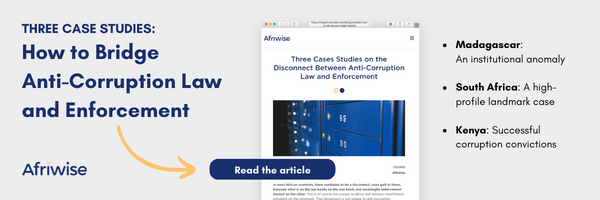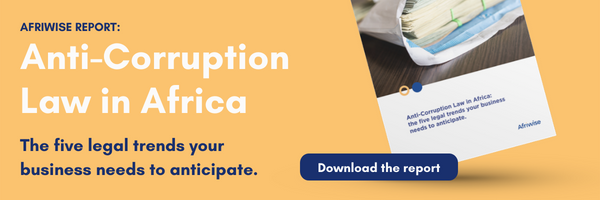There is an African proverb that states, “Greed loses what it has gained.” Corruption has been rife throughout the continent, often with the active acquiescence of Western and other foreign entities. However, anti-corruption initiatives have taken hold in many African countries, with something akin to a ‘wave’ of them in just the last few years.
Africa remains ravaged by corruption. A 2019 survey of citizens in 35 countries by the pan-African Afrobarometer research network found that corruption remains a blight for many of those surveyed, with one in four respondents having had to pay a bribe within the previous year. The survey also found that the majority of African respondents believed that corruption had gotten worse and that their governments were not doing enough to combat it. The African Union (AU) has estimated that corruption adversely affects the lives of at least 25 million African children and is one of the leading obstacles to economic and human development and human rights in Africa.
Africa continues to fare poorly in international anti-corruption rankings. In the annual Corruption Perceptions Index (CPI) for 2021 as collated by Transparency International, the highest-ranking African country was Seychelles in 23rd place with a CPI score of 70, with Cabo Verde coming in next in 39th place with a score of 58. Botswana, Mauritius, Rwanda, Namibia and São Tomé e Principe followed, with only 16 African countries making it into the Top 100 for 2021. Four of the ten-lowest scoring countries in the ranking were from Africa, with South Sudan in last place, at 180th and a CPI score of just 11, equating to ‘very corrupt’.
The analysis by Transparency International was rather damning: “With an average score of 33 out of 100, Sub-Saharan Africa shows no significant improvement on the 2021 Corruption Perceptions Index (CPI). The gains made by a handful of countries are overshadowed by backsliding or stagnation in others and the region’s poor performance overall, as 44 out of 49 countries assessed on the index still score below 50.”
Nevertheless, the continent has made collective efforts to address corruption. The African Union Convention on Preventing and Combating Corruption (AUCPCC) was adopted by the AU on July 1st, 2003, and came into force three years later. The convention’s focus is on the prevention and criminalization of corruption, as well as international cooperation and asset recovery relating to it. The convention is applicable to corruption in both the public and private sectors. To date, 49 out of 55 member states have signed the AUCPCC, with 44 having ratified it. Transparency International highlighted the shortcomings of the convention in a 2021 report, stating that, “To effectively track and prosecute money laundering, African governments need to dedicate more resources to specialist skills, such as financial analysts and tax inspectors, and improve cooperation between these experts and prosecutors. Just as important is ensuring complete independence of authorities and courts to prevent well-connected money launderers from escaping prosecutions and convictions.”
Regional efforts have also occurred to foster cooperation between neighbouring countries in capacity-building for the fight against corruption. An example of this was a workshop in early 2022 created and sponsored by the eight countries (Angola, Botswana, Malawi, Mozambique, Namibia, South Africa, Zambia and Zimbabwe) that comprise the Southern African division of the United Nations Office for Drugs and Crime (UNODC). It was a high-level, multi-disciplinary effort to try and fast-track the implementation of legislation in the region aligned with the UN Convention against Corruption (UNCAC). Even Transparency International has shown some optimism regarding anti-corruption efforts by African nations, stating that, “Almost every country now has a dedicated government agency responsible for fighting against corruption. Furthermore, many countries have specialised agencies for specific anti-corruption areas like financial intelligence to address money laundering and illicit flows; integrity agencies to address conflict of interest and illicit enrichment, among others.”

